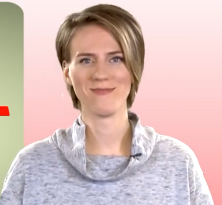(单词翻译:单击)
This is Everyday Grammar. I'm Kaveh.
欢迎收看《每日语法》栏目,我是卡维。
And I'm Lucija. Today we are going to introduce gerunds and infinitives.
我是露西佳,今天我们介绍一下动名词和不定式。
Hey Lucija, I missed the meeting this morning.
嘿,露西佳,今早上我错过了会议,
Did we discuss to change the vacation policy?
会上有没有说放假政策的变更呢?
You mean, did we discuss changing the vacation policy?
你是说,我们是不是有讨论更改放假政策?
Well, what's the difference?
嗯,有什么差别吗?

That's a tough question.
这个问题很难。
Basically, some verbs are followed by gerunds.
总的来说,有些动词后接动名词,
Gerunds are the –ing form of a verb. They function like nouns.
动名词即动词的-ing形式,相当于名词的作用,例如:
I suggest going to the beach.
我建议去海边。
So what's an infinitive?
那不定式又是什么?
An infinitive is the to form of a verb.
不定式就是动词的to的结构,例如:
I want to go to the beach.
我想去海边。
Well, how do I know when to use a gerund and when to use an infinitive?
这样,那我如何能知道什么时候用动名词,什么时候用不定式呢?
Well, it's complicated. Basically, some verbs are followed only by gerunds.
这个有点复杂,总的来说,部分动词只能接动名词,例如:
I suggest studying English.
我建议学习英语。
Other verbs are only followed by infinitives.
其他的动词只能接不定式,例如:
I want to dance.
我想跳舞。
And some verbs can be followed by gerunds and infinitives.
部分动词既能接动名词又能接不定式。例如:
I like to run.
我喜欢跑步。
I like running.
我喜欢跑步。
Wow. That seems pretty complicated.
哇,看起来相当复杂。
If there a system for deciding when to use a gerund and when to use an infinitive?
假如有一套系统的方法来确定什么情况用动名词,什么情况用不定式。
There are some rules but they're very technical.
有一些规则,但是偏专业,
It's probably easier to just memorize the most common verb combinations.
相对来说,记住最常用的动词搭配可能还会更容易。
Check out the list on our website learningenglish.voanews.com.
欢迎访问我们的官方网站learningenglish.voanews.com查看搭配列表。


